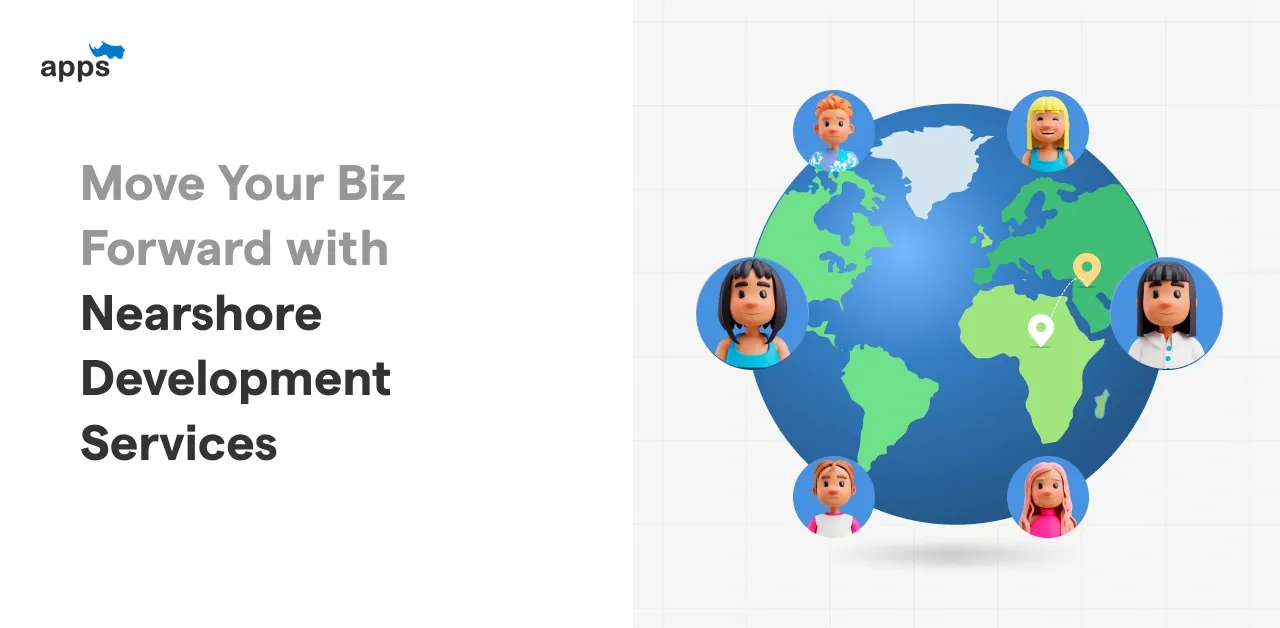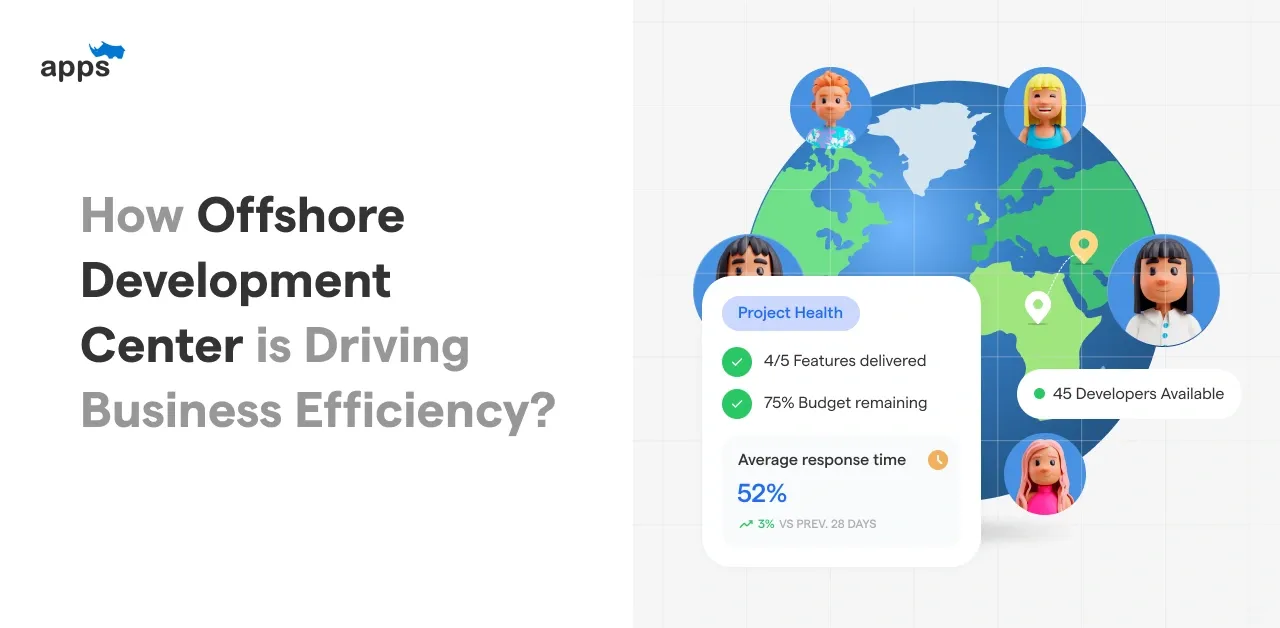- Introduction
- What is Offshore Development?
- Why Offshore Development is Important for Global Enterprises
- Best Practices for Offshore Project Management
- Conclusion
- Frequently asked questions (FAQs)
Table of Contents
Offshore Development: A Game-Changer for Global Enterprises

Introduction
Let's talk about something that's getting viral in the business world – outsourcing software development. Today, companies are seeking talent outside of their immediate area. They are reaching out to offshore development teams, and believe us, the trend is spreading like wildfire.
In this blog post, we delve deeply into the offshore development landscape and the reasons why it's transforming global businesses.
Offshore development is comparable to a hidden weapon. It's when companies outsource their software duties to teams in various parts of the world, typically to save money.
So, we're talking about this fascinating collaboration in which specialists from various locations work together to develop brilliant software solutions. It's not just about saving money; it's also about casting a wider net for talent and acquiring that extra dash of knowledge.
We will explain why offshore development is attracting the attention of astute enterprises worldwide.
Let us get into it right away!
What is Offshore Development?
Offshore development refers to the practice of outsourcing software development tasks to teams located in different countries, typically with lower labor costs. This approach allows companies to leverage the expertise and resources of offshore teams to deliver high-quality software solutions.
Why Offshore Development is Important for Global Enterprises
Offshore development has become an essential strategy for global enterprises. Let's take a closer look at why it is so important for companies around the world.
Cost savings
Global enterprises are always looking for ways to optimize their operations and reduce costs. Offshore development provides an opportunity to maximize cost savings while maintaining high-quality software delivery. By leveraging offshore teams, global enterprises can achieve greater efficiency without compromising on performance.
Access to a diverse talent pool
The global talent landscape is vast and diverse. Offshore development allows global enterprises to access talent from different parts of the world, bringing in a unique set of skills, perspectives, and experiences. This diverse talent pool enhances the innovation potential of global enterprises, fostering creativity and driving business growth.
Flexibility and scalability
Global enterprises operate in dynamic and ever-changing markets. They need the flexibility to adapt to evolving business needs and scale their operations accordingly. Offshore development offers the necessary flexibility and scalability to meet these demands. By partnering with offshore teams, global enterprises can quickly adjust their software development capabilities, ensuring a competitive edge in the market.
Advantages of Offshore Development
Offshore development offers numerous benefits to companies aiming to optimize their software development processes, including cost savings, access to top talent, accelerated development timelines, enhanced scalability, and effective communication & project management.
Cost Savings
By partnering with offshore teams, companies can significantly reduce labor and operational costs, as highly skilled professionals are often available at a fraction of the cost compared to developed countries.
Access to Top Talent
Offshore development allows companies to tap into a global talent pool, enabling them to acquire specialized skills and expertise that may not be available in their local market.
Accelerated Development Timelines
Offshore development enables round-the-clock development by leveraging time zone differences, leading to faster time-to-market and the ability to meet tight deadlines.
Enhanced Scalability
Offshore development provides the flexibility and resources needed to scale up or down as per project needs, allowing companies to efficiently manage resources without overburdening local teams.
Effective Communication & Project Management
Successful offshore development relies on overcoming communication barriers by establishing clear communication channels, investing in robust collaboration tools, and fostering a culture of trust and transparency.
By capitalizing on these advantages, companies can deliver exceptional software solutions, stay ahead of the competition, and seize opportunities without unnecessary delays.
Best Practices for Offshore Project Management
Managing offshore development projects requires careful planning and execution. Adopting best practices helps ensure successful outcomes and effective utilization of resources.
Key considerations for managing offshore development projects
When managing offshore projects, it's crucial to establish clear project goals, define roles and responsibilities, and create a comprehensive project plan. Regularly tracking progress, conducting status meetings, and providing timely feedback are essential to keep the project on track. Additionally, fostering a collaborative and transparent working environment contributes to the success of offshore development projects.
Agile methodologies and project management frameworks for successful outcomes
Agile methodologies and project management frameworks like Scrum or Kanban are well-suited for offshore development. These approaches ensure iterative development, continuous feedback, and quick adaptations to changing project requirements. By embracing agile practices, companies can enhance project visibility, improve team collaboration, and achieve successful outcomes.
Conclusion
In the grand tapestry of software development, offshore development stands out as a beacon, offering a plethora of benefits to companies seeking to take the lead in this dynamic industry.
Offshore development remains not only a participant in this industry's ebb and flow, but also an agile adopter of emergent trends and technologies. The transformative forces of automation, AI, and machine learning redefine the fundamental nature of offshore software solutions.
Cultural compatibility, value congruence, language proficiency, and the coordination of time zones are crucial factors. These are the human strands woven into the fabric of successful offshore partnerships, beyond the criteria.
Offshore development is essentially a voyage, an ongoing adaptation to the rhythm of technological evolution, and a testament to the influence of collaboration in molding the future of software development.
Frequently asked questions (FAQs)
What is offshore development and how can it benefit global enterprises?
Offshore development refers to outsourcing software development projects to a team located in a different country. It offers benefits such as cost savings, access to top talent, accelerated development timelines, and enhanced scalability.
How can offshore development help global enterprises access top talent?
Offshore development allows global enterprises to tap into a larger talent pool worldwide. They can hire skilled professionals and experienced developers from countries with strong technical expertise, expanding their access to top talent.
What are the cost savings associated with offshore development for global enterprises?
Offshore development offers cost savings due to lower labor costs in certain regions. Global enterprises can leverage these cost advantages to achieve their development goals and invest the saved funds into other areas of their business.
Can offshore development help global enterprises accelerate their development timelines?
Yes, offshore development can accelerate development timelines. With teams working across different time zones, development can occur around the clock, resulting in faster turnaround times and shortened project delivery timeframes.
How does offshore development enhance scalability for global enterprises?
Offshore development provides global enterprises with flexible resources that can be quickly scaled up or down as per project requirements. This flexibility allows businesses to adapt to changing demands, ensuring efficient resource allocation and avoiding unnecessary overhead.
Are there any potential challenges or risks associated with offshore development for global enterprises?
While offshore development offers numerous benefits, there can be challenges such as communication barriers, cultural differences, and time zone management. It is crucial for enterprises to establish effective communication channels and strategies to mitigate these challenges.
Table of Contents
- Introduction
- What is Offshore Development?
- Why Offshore Development is Important for Global Enterprises
- Best Practices for Offshore Project Management
- Conclusion
- Frequently asked questions (FAQs)




